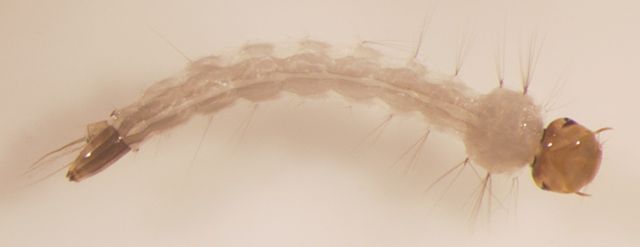Mosquitoes Can Transmit Zika to Their Offspring
Researchers at the University of Texas Medical Branch in Galveston say they’ve discovered a new route for transmission of the Zika virus: from female mosquitoes to some of their offspring.

While not particularly surprising, the finding — published this week in the American Journal of Tropical Medicine and Hygiene — is an important development in understanding the disease, and could complicate efforts to fight its spread.
“This is not going to change the epidemiology of Zika in the United States very much,” said pathologist Robert Tesh, an author of the paper. “I think that what we have shown is that the virus can survive from one season to the next.”
Infection with the virus can be devastating for pregnant women, whose children may be born with abnormally small heads, a condition known as microcephaly. After spreading widely in Latin America over the past year, local-transmission of Zika has now cropped up in Florida.
From what they saw in this new study, which examined the offspring of about 50 infected mosquitoes, Tesh and his colleagues estimated that one in every 290 Aedes aegypti mosquito inherits Zika from its mother. (None of the Aedes albopictus mosquitoes passed down the virus.) While the proportion of affected offspring is small, it could be enough to allow Zika to survive winters and dry periods, and to persist even in places where mosquitoes have seemingly been eradicated.
“If you get rid of most of the mosquitoes, or even if you could get rid of all of the adults, you still have the eggs and the larvae,” Tesh said. “If they are infected, when they become adults they are going to be able to infect new people and get the cycle started again.”
Of course, female mosquitoes don’t always need to pass a viral load to their offspring in order for epidemics to bridge seasons — some viruses can survive the winter in adults insects. Carol Blair, a researcher in the Department of Microbiology, Immunology and Pathology at Colorado State University, pointed to West Nile, by way of example.
“When West Nile virus came into the East Coast, it was speculated that it wouldn’t last for more than one season because those mosquitoes, Culex mosquitoes that transmit West Nile virus, are not known to allow vertical transmission,” Blair said. “But, surprise, West Nile bounced back the next transmission season.”
For those mosquito species that can accomplish vertical transmission, researchers are already releasing genetically-modified male mosquitoes whose offspring cannot survive without an antibiotic antidote.
While this most recent paper shows vertical transmission of Zika in a laboratory, the next step will be finding it in the wild. That will involve collecting and testing mosquito larvae in areas where the disease is spreading. In the wild, a number of factors might keep the virus from being inherited. Still, Tesh said, he wouldn’t be surprised to find it there.
An earlier version of this post incorrectly suggested that Culex mosquitoes were capable of vertical transmission of viruses. The text has been updated to correct the error. It has also been updated to clarify that the research team is at the University of Texas Medical Branch in Galveston.










